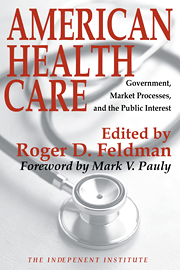Untoward consequences usually follow when government involves itself in the delivery of services. California’s electricity consumers are learning that the benefits of deregulation cannot be realized if the politicians do not actually deregulate. But for patients experiencing firsthand the politically-created shortages in the market for health care services, the consequences can be far more serious than the lights going out.
When government intervenes in the provision of health care, its accompanying regulations protect medical providers’ incomes from meaningful price competition, make medical insurance affordable for less-healthy consumers but drive healthy consumers into the ranks of the uninsured.
Nearly half of all seniors will spend time in a nursing home. Although Medicaid will support two-thirds of them, the remaining third will not be covered by Medicaid and must make the difficult and complex decision of whether or not to purchase health insurance.
Contrary to conventional wisdom, the private sector can effectively discipline doctors and provide health insurance products that consumers want at affordable prices.
From the consumer’s standpoint, market-based solutions to problems in the delivery of health care services should have preference over government intervention. But if President George W. Bush’s experience in Texas gives any indication, both he and incoming Health and Human Services Secretary Tommy Thompson are likely to promote legislation similar to a law Texas enacted that would extend a patients’ bill of rights to the entire nation.
The inevitable effect of this involuntary rewriting of the contract between patients and providers will be to raise health care costs -- and health care revenues. Defenders of the Texas law claim that it has not had a significant impact on insurance premiums in that state. That’s rather naive. Since the Texas Health Care Liability Act’s passage in 1997, at least seven lawsuits invoking the new law have been filed, but none has yet gone to a jury. In the last Congress, a similar bill that passed the House but failed in the Senate may yet become law because several key senators who opposed a national patients’ bill of rights were defeated. Such legislation may spell more trouble for HMOs that have already had to escalate costs as much as 30 percent in exchange for high-technology equipment, new drugs, and the modernization of facilities.
Hence, Washington appears even more ready to embrace government intervention, rather than market-based solutions, to cure the nation’s health care ills.
But what will a new President and a new Congress do about the more pressing health policy questions -- how to secure the future of Medicare and what to do about the rising cost of medical technology?
Medicare surpluses are only temporary and will be eaten up by looming increases in Medicare spending. Despite some recent progress, the Medicare trust fund is still scheduled to go broke in 2025, according to the latest report of its trustees. Economists who study health care spending agree that technology is the main cause of increasing costs. How much is new medical technology worth, how much can we afford, and who should get it? The President has been silent on these questions, while the electorate’s increasing focus on health care demands answers. Medicare continues to add costly tests, like the recently added positron emission tomography test, despite lacking evidence that such tests may be useful in all but a handful of cases.
One recent estimate places the value of extending human life for one year at about $100,000. By comparison, the $300,000 cost of a liver transplant, which extends life for about seven years, seems like a very good investment. Much of high-technology medical care is devoted to people in their last year of life. There are also 11 million uninsured children. Who should decide where health care resources are allocated?
It is not reasonable to believe that private markets alone can solve the problem of how much technology the nation can afford. The government plays a large role in supporting medical research, which lays the foundation for new technologies. Most economists consider medical research a "public good" because it produces benefits for the public that couldn’t be captured by a private sponsor. But once technology is available, the private sector outperforms government in using that technology to help patients.
During the recent campaign, the presidential candidates sidestepped the interplay of public and private responsibilities in health care. Now that the campaign is over, for the sake of those who rely on health care services, the incoming administration and the public must be ready to face the tough questions.
Tough Health Care Choices: Should the Government Do Triage?
Roger D. Feldman is the Blue Cross Professor of Health Insurance and Professor of Economics at the University of Minnesota's Center for Health Services Research.
Comments
Before posting, please read our Comment Policy.







